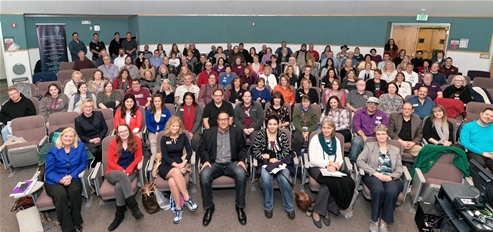
Teaching Ethics Across Southern Colorado
More Info
Faculty Opportunities include ethics education workshops, seminars, and online courses from academic and professional associations.
Cases & Debates
We provide original ethics cases and debates from our faculty and student generated cases and debates for use in the classroom.
Ethics Links
Helpful ethics links and resources to expand your ethical curricula beyond the classroom. Links include simulations, real-world examples, videos, competitions and more.
Curricula
Teaching materials that can enhance ethics education across the curriculum.
Teaching Ethics across the Curriculum
Teaching Ethics across the Curriculum are workshops that the DFEI holds at higher education campuses. View our previous workshops below:
The ninth workshop in the SCHEC campus series was held at Otero College on August 14, 2018. The workshop, "Using Daniels Fund Ethics Initiative Principle-based Ethics Education across the Curriculum" focused on the following ideas:
- Faculty confidence in addressing ethical issues
- Experiential learning
If you uncovered fraud within your organization, would you say something? If so, who would you tell? What would you say?
Rita Crundwell stole $53 million while working for the small town of Dixon, Illinois. She abused the trust of city taxpayers, her coworkers and the public. Her crime was the biggest municipal fraud in U.S. history… but it could have been prevented.
On March 29, faculty, staff and community attended Pueblo Community College to attend "Watch ∙ Ask ∙ Decide: Ethical Leadership Town Hall Meeting" to see and discuss footage from the in process documentary, "All the Queen’s Horses."
They also:
- Learned how this fraud went undetected for 20 years
- Heard why some people are reluctant to report misconduct
- Understood how relationships can create ethical blind spots
- Discussed what to do if you discover misconduct in your organization
When: Thursday, March 29, 1:00pm - 3:00pm
Where: Pueblo Community College Hoag Theater
The eighth workshop in the SCHEC campus series was held at Colorado State University - Pueblo on April, 13 2017. This workshop focused on the following ideas:
- Faculty confidence in addressing ethical issues
- Experiential learning
The seventh workshop in the SCHEC campus series was held at Pikes Peak Community College on April 7, 2017. This workshop focused on the following ideas:
- Faculty confidence in addressing ethical issues
- Experiential learning
The sixth workshop in the SCHEC campus series was held at Adams State University on February 22, 2017. The theme of this workshop was "How can we equip our students to handle ethical dilemmas without promoting "ethics fatigue"?" Ethics fatigue occurs when students have talked about ethics in every class and are "tired of it" or "know it already." This workshop focused on the following ideas:
- Faculty confidence in addressing ethical issues
- Experiential learning
The fifth workshop in the SCHEC campus series was held at Pueblo Community College on February 13, 2017. The theme of this workshop was "How can we equip our students to handle ethical dilemmas without promoting "ethics fatigue"?" Ethics fatigue occurs when students have talked about ethics in every class and are "tired of it" or "know it already." This workshop focused on the following ideas:
- Faculty confidence in addressing ethical issues
- Experiential learning
- Student Engagement

Pueblo Community College Southern Colorado Higher Education Consortium Faculty Ethics Workshop
Dr. Tracy Gonzalez-Padron, Director of the Daniels Fund at UCCS began by introducing the Daniels Ethics Initiative Principles and strategies for using the Principles for teaching ethics. This included steps for making ethical decisions, a relational case involving the Principles, instruction on how to use the Principles to assess recommendations, and notes on how to effectively teach ethics in the classroom. This included a Q&A session and an Ethics Case Activity.
Scott Van Ness, Instructor of Operations Management presentation was themed, "Ethics Lab: Recreating the Stress of Ethical Challenges". The presentation began by introducing the guide and exercise for the Ethics Lab. Instructor Van Ness concluded by discussing the application of the lab to the industry and the impact the lab would have on students.
The final part of the workshop, involved a networking session for the presenters and the faculty, and introduced materials and resources that would be important for the development of ethical activities for the Trinidad campus.

Trinidad State College Southern Colorado Higher Education Consortium Faculty Ethics Workshop
Dr. Tracy Gonzalez-Padron, Director of the Daniels Fund at UCCS presentation began by introducing the Daniels Ethics Initiative Principles and strategies for using the Principles for teaching ethics which included steps for making ethical decisions, a relational case involving the Principles, instruction on how to use the Principles to assess recommendations, and notes on how to effectively teach ethics in the classroom. "Facebook: A Change for the Good or Hanging Users Out to Dry?" case was used for audience analysis.
Dr. Martin Key, Assistant Professor of Marketing, College of Business presented "Exploring Ethical Issues in Social Media". This included why social media ethics matter and what are considered to be Social Media Ethics. Dr. Key then discussed how to use social media to teach ethics with student examples on the effects of social media ethics. Student opportunities were discussed such as UCCS Business Ethics Case Competition, the Student Center for the Public Trust (SCPT) business ethics student organization and various samples of the student engagement with these opportunities were distributed. Materials and resources that would be important for the development of ethical activities for the Lamar campus were made available.
Dr. Tracy Gonzalez-Padron, Director of the Daniels Fund at UCCS presented on the Daniels Ethics Initiative Principles and strategies for using the Principles for teaching ethics "Teaching across the Curriculum." The presentation included steps for making ethical decisions, a relational case involving the Principles, instruction on how to use the Principles to assess recommendations and notes on how to effectively teach ethics in the classroom.
Gordon Stringer, Senior Instructor of Finance and Informational Systems presented "Ethics in Finance and Organization Decision Making". He introduced the class exercises to teach ethics, the weekly presentation and format of the Ethics and Finance class, and the grading rubric followed with personal insight on how to teach ethics cases in a finance class.
Scott Van Ness, Instructor of Operations Management presented "Ethics Lab: Recreating the Stress of Ethical Challenges" introducing the guide and exercise for the Ethics Lab. He included discussing the application of the lab to the industry and the impact the lab would have on students. Materials and resources that would be important for the development of ethical activities for the Fort Lewis campus were provided.
How can we equip our students to handle ethical dilemmas without promoting "ethics fatigue"? Ethics fatigue occurs when students have talked about ethics in every class and are "tired of it" or "know it already." This workshop focused on two ideas in teaching ethics:
- Faculty confidence in addressing ethical issues - While many faculty address ethical issues in class, some are not sure how to provide solutions for their students. The barriers for acting ethical are high, such as: financial barriers, competition barriers and cultural barriers. Ethics is not the primary area of expertise for most instructors. We focused on ways to highlight ethics in any subject matter and how to encourage discussion and learning.
- Experiential learning - What are the best methods of teaching business ethics? Research shows that cases, debates, simulations (class-room or web-based) and company projects provide the greatest learning for an ethical issue. We provided resources and tools for faculty to utilize in class.